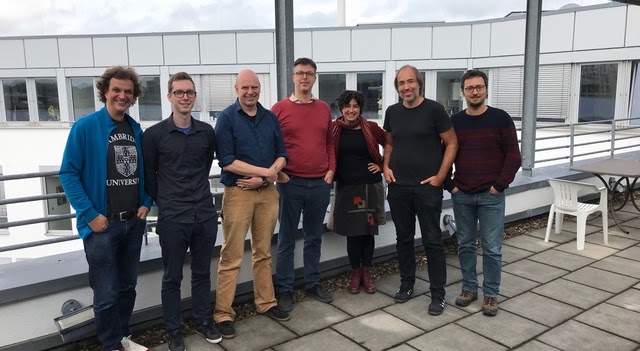This interdisciplinary collaboration project involving Computational Linguistics, Machine Learning and Political Science has the aim of developing new computational models and methods for analyzing argumentation in political discourse – specifically capturing the dynamics of discursive exchanges on controversial issues over time. The goal is to develop tools to support analysis of the possible impact of arguments advanced by different political actors.
In the first phase (2018-2021), we focussed on the German debates on immigration and pension, and on the methodological aspects of such collaboration. With this as a starting point, in the second phase (2021-2024) we plan on expanding our investigation multilingually and work on the COVID-19 policy debate.
MARDY is part of the DFG priority program RATIO (Robust Argumentation Machines).
People
University of Bremen
University of Stuttgart
Previous members

Publications
Journal Articles
- Nico Blokker, Andre Blessing, Jonas Kuhn, Sebastian Padó, Erenay Dayanik and Gabriella Lapesa. 2023 “Between welcome culture and border fence: The European refugee crisis in German newspaper reports.” Language Resources and Evaluation, 57:121-153, 2023. [url]
- Erenay Dayanik, Thang Vu and Sebastian Padó. Bias Identification and Attribution in NLP Models With Regression and Effect Sizes.
Northern European Journal of Language Technology, 8(1), 2022.[url] - Lapesa, Gabriella, Andre Blessing, Nico Blokker, Erenay Dayanik, Sebastian Haunss, Jonas Kuhn and Sebastian Padó. 2020. “Analysis of Political Debates through Newspaper Reports: Methods and Outcomes”. Datenbank-Spektrum 20: 143–153. [doi]
- Haunss, Sebastian, Jonas Kuhn, Sebastian Padó, Andre Blessing, Nico Blokker, Erenay Dayanik and Gabriella Lapesa. 2020. “Integrating Manual and Automatic Annotation for the Creation of Discourse Network Data Sets”. Politics and Governance 8(2): 326–339. [doi]
- Kuhn, Jonas. 2019. “Computational text analysis within the Humanities: How to combine working practices from the contributing fields?”. Language Resources and Evaluation 53(4): 565–602. [doi]
Conference proceedings
- Dmitry Nikolaev, Tanise Ceron and Sebastian Padó. Multilingual estimation of political-party positioning: From label aggregation to long-input Transformers. To appear in Proceedings of EMNLP. Singapore, 2023. [url]
- Tanise Ceron, Dmitry Nikolaev and Sebastian Padó. Additive manifesto decomposition: A policy domain aware method for understanding party positioning. Findings of ACL. 2023. [url]
- Tanise Ceron, Nico Blokker and Sebastian Padó. Optimizing text representations to capture (dis)similarity between political parties. In: Proceedings of CONLL. 2022 [url]
- Nico Blokker, Tanise Ceron, André Blessing, Erenay Dayanik, Sebastian Haunss, Jonas Kuhn, Gabriella Lapesa and Sebastian Padó. Why Justifications of Claims Matter for Understanding Party Positions. In: Proceedings of the 2nd Workshop on Computational Linguistics for Political Text Analysis. 2022. [BibTeX]
- Dayanik, Erenay, Andre Blessing, Nico Blokker, Sebastian Haunss, Jonas Kuhn, Gabriella Lapesa and Sebastian Pado. Improving Neural Political Statement Classification with Class Hierarchical Information. In: Findings of the Association for Computational Linguistics: ACL 2022. Dublin, Ireland. [url]
- Erenay Dayanik, Andre Blessing, Nico Blokker, Sebastian Haunss, Jonas Kuhn, Gabriella Lapesa and Sebastian Padó. 2021. “Using Hierarchical Class Structure to Improve Fine-Grained Claim Classification.” In: Proceedings of the ACL Workshop of Structured Prediction, pages 53-60. Bangkok, Thailand, 2021. [url]
- Dayanik, Erenay, Andre Blessing, Nico Blokker, Sebastian Haunss, Jonas Kuhn, Gabriella Lapesa and Sebastian Padó. 2021. Using Hierarchical Class Structure to Improve Fine-Grained Claim Classification. Online: Association for Computational Linguistics, [url].
- Dayanik, Erenay and Sebastian Padó. 2020. Masking Actor Information Leads to Fairer Political Claims Detection. Online: Association for Computational Linguistics, [url].
- Lapesa, Gabriella, Andre Blessing, Nico Blokker, Erenay Dayanik, Sebastian Haunss, Jonas Kuhn and Sebastian Padó. 2020. DEbateNet-mig15:Tracing the 2015 Immigration Debate in Germany Over Time. Marseille, 11–16 May 2020, [url].
- Blessing, Andre, Nico Blokker, Sebastian Haunss, Jonas Kuhn, Gabriella Lapesa and Sebastian Padó. 2019. An Environment for Relational Annotation of Political Debates. Florence, Italy: Association for Computational Linguistics, [url].
- Padó, Sebastian, Andre Blessing, Nico Blokker, Erenay Dayanik, Sebastian Haunss and Jonas Kuhn. 2019. Who Sides with Whom? Towards Computational Construction of Discourse Networks for Political Debates. Florence, Italy: Association for Computational Linguistics, [url].
Invited talks
- Sebastian Padó: Computational construction of discourse networks for political debates. Invited talk at the 3rd Workshop on Computational Linguistics for the Political and Social Sciences, Ingolstadt. September 22, 2023.
- Sebastian Padó: Computational analysis of claims and frames in political debates. Invited talk at the Computational Linguistics Group at the University of Düsseldorf. November 2022.
- Sebastian Haunss: Modeling Argumentation Dynamics in Political Discourse, Talk at the Research Conference Pandemics (DFG) November 15th 2021.
- Gabriella Lapesa: Argument Mining for Social Good, Invited contribution to the panel discussion at the Argument Mining Workshop (co-located with EMNLP 2021, Punta Cana, Dominican Republic) November 10th 2021.
- Sebastian Padó: MARDY: computational construction of discourse networks for political debates, Invited talk at the Department of Communication Science at the University of Amsterdam, September 29th 2021.
- Sebastian Haunss, Jonas Kuhn: Modeling Argumentation Dynamics in Political Discourse, Invited contribution to the panel discussion at the Workshop on Computational Linguistics for Political Text Analysis (co-located with KONVENS 2021, Düsseldorf, Germany) September 6th 2021.
- Sebastian Padó: Towards computational construction of discourse networks for political debates, Invited talk at the Department of Translation and Language Sciences at the Universitat Pompeu Fabra (Barcelona, Spain), November 4th 2019.
- Sebastian Haunss, Nico Blokker: Semi-automatic construction of discourse networks from newspaper articles, Invited talk at the workshop Words and Actions. Political text mining at the University of Helsinki (Finland), January 13-14 2020
- Erenay Dayanik: Semi-automatic construction of discourse networks from newspaper articles, Invited talk at the workshop Words and Actions. Political text mining at the University of Helsinki (Finland), January 13-14 2020
- Jonas Kuhn: Journobots: friend or foe?, Invited talk at the 11th World Conference of Science Journalists (Lausanne), 1-5 July 2019
